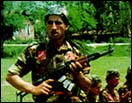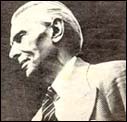The British argued that it was imperative for Hindustan and Pakistan to have a common army
 By early 1947, the Pakistan movement had become so strong that
it could not be checkmated either by the British or the Hindus.
Both of them, therefore, agreed to the division of India. But
even after the acceptance the British tried to keep India united
in some form. The main reason was that they did not want to divide
the Indian armed forces. This was necessary not only for the security
of the British lives and property in India but also for the future
defence of the subcontinent from a possible Soviet threat and
for their undisturbed use in an integrated system of the defence
of the Commonwealth countries.
By early 1947, the Pakistan movement had become so strong that
it could not be checkmated either by the British or the Hindus.
Both of them, therefore, agreed to the division of India. But
even after the acceptance the British tried to keep India united
in some form. The main reason was that they did not want to divide
the Indian armed forces. This was necessary not only for the security
of the British lives and property in India but also for the future
defence of the subcontinent from a possible Soviet threat and
for their undisturbed use in an integrated system of the defence
of the Commonwealth countries.
The British also needed a secure
and a peaceful ally in India so that they could continue to use
her naval and air bases. This was essential for the British to
maintain their lines of communication with their colonies in the
Far East. The British, therefore, did their best to impress upon
the Muslim League leaders that they should not demand the division of the
armed forces. They argued that from the economic, military and
strategic points of view it was imperative that they must have
a common army and a joint defence of Hindustan and Pakistan.
The Congress supported the move, but the Muslim League firmly rejected the suggestion.
Jinnah forcefully argued that if the defence of India was considered
as one whole, the case of Pakistan would fall to the ground. Therefore,
the Muslim League insisted on the division of the armed forces prior to
Partition. It demanded an increase in the percentage of Muslim
officers and men in the armed forces.
 The British, however, continued
to side-track the issue and, even after the announcement of the June
3, 1947 Plan for the Independence and Partition of India, Mountbatten insisted on some such arrangements or at least having
a common governor-general of both Hindustan and Pakistan. This
demand was the logical conclusion of the British insistence on
keeping India a united country with its armed forces undivided
within the British Commonwealth. By having British officers, British
commander-in-chief and a British governor-general, they wished
to maintain an all-British chain of command for as long as possible.
The British, however, continued
to side-track the issue and, even after the announcement of the June
3, 1947 Plan for the Independence and Partition of India, Mountbatten insisted on some such arrangements or at least having
a common governor-general of both Hindustan and Pakistan. This
demand was the logical conclusion of the British insistence on
keeping India a united country with its armed forces undivided
within the British Commonwealth. By having British officers, British
commander-in-chief and a British governor-general, they wished
to maintain an all-British chain of command for as long as possible.
The Muslim League firmly rejected a united army, a permanent joint defence
agreement or a common governor-general which would have practically
jeopardised the sovereign status of Pakistan. The Muslim League, therefore,
succeeded in its struggle to achieve an independent and sovereign
state notwithstanding the British and the Congress pressure.
Excerpted from Making of Pakistan: The Military Perspective, by Dr Noor-ul Haq, Reliance Publishing House, 1997, Rs 395, with the publisher's permission. Readers who wish to buy a copy of this book may write to Reliance Publishing House, 3026/7H, Ranjit Nagar, New Delhi 11 00 08.
|

